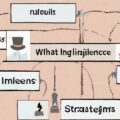Emotional Intelligence (EI) has become a crucial component in both personal and professional success. Understanding the major frameworks and models of EI can provide profound insights into how individuals can better manage their emotions and improve their interpersonal relationships. In this article, we’ll explore the key frameworks and models of emotional intelligence.
What is Emotional Intelligence?
Emotional Intelligence, often abbreviated as EI or EQ (Emotional Quotient), refers to the ability to recognize, understand, and manage our own emotions as well as the emotions of others. It involves self-awareness, self-regulation, motivation, empathy, and social skills.
The Goleman Model
One of the most popular models of emotional intelligence is the Goleman Model, proposed by Daniel Goleman. This model categorizes EI into five main components:
- Self-Awareness: Recognizing one’s emotions and their impact.
- Self-Regulation: Managing one’s emotions to adapt to changing circumstances.
- Motivation: Using emotional factors to achieve goals, enjoy the learning process, and persevere in the face of obstacles.
- Empathy: Understanding and considering other people’s emotions, especially when making decisions.
- Social Skills: Managing relationships to move people in desired directions.
The Bar-On Model
Reuven Bar-On’s model of emotional intelligence, known as the Bar-On Model, focuses on emotional-social intelligence. It includes five main domains:
- Intrapersonal Skills: Understanding and expressing one’s own emotions.
- Interpersonal Skills: Developing and maintaining relationships.
- Adaptability: Adjusting emotions and behavior to changing conditions.
- Stress Management: Managing stress effectively.
- General Mood: Maintaining a positive outlook and overall emotional well-being.
The Mayer-Salovey-Caruso Model
The Mayer-Salovey-Caruso Emotional Intelligence Test (MSCEIT) is a performance-based measure of EI, developed by Peter Salovey and John D. Mayer. This model defines EI through four branches:
- Perceiving Emotions: The ability to detect and decipher emotions in faces, pictures, voices, and cultural artifacts.
- Using Emotions: The ability to harness emotions to facilitate various cognitive activities, such as thinking and problem-solving.
- Understanding Emotions: The ability to comprehend emotion language and to appreciate complicated relationships among emotions.
- Managing Emotions: The ability to regulate emotions in both ourselves and in others.
The Six Seconds Model
The Six Seconds Model is an action-oriented framework that focuses on three key pursuits for emotional intelligence development:
- Know Yourself: Increasing self-awareness.
- Choose Yourself: Building self-management and self-direction.
- Give Yourself: Aligning daily choices with a sense of purpose.
Why is Emotional Intelligence Important?
Emotional intelligence is critical for several reasons. High EI individuals tend to have better mental health, exemplary job performance, and more potent leadership skills. By understanding and developing EI, individuals can better manage stress, communicate effectively, and resolve conflicts more efficiently.
FAQ
What are the key components of emotional intelligence?
The key components of emotional intelligence include self-awareness, self-regulation, motivation, empathy, and social skills.
How can I improve my emotional intelligence?
Improving emotional intelligence involves practices such as self-reflection, mindfulness, seeking feedback, and developing empathy.
Is emotional intelligence more important than IQ?
While both are important, emotional intelligence is often seen as more critical for personal and professional success because it involves managing emotions and relationships effectively.
Can emotional intelligence be learned?
Yes, emotional intelligence can be learned and developed over time through training and practice.
What is the difference between emotional intelligence and emotional quotient (EQ)?
Emotional intelligence refers to the ability itself, while emotional quotient (EQ) is a measure of that ability, similar to how IQ measures intelligence.









